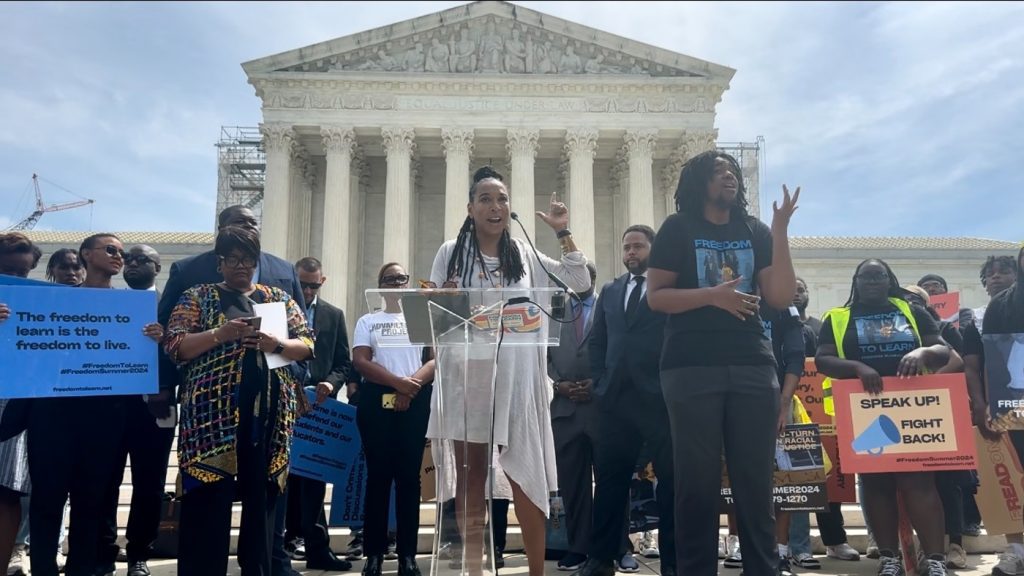Civil rights leaders from different parts of the country gathered in Washington, D.C., on Friday to oppose bans on books and growing attacks on diversity, equity and inclusion (DEI). They stated that restrictions on education were harming teachers, students and democracy as a whole.
Protesters at the Freedom to Learn rally walked from the Library of Congress to the Supreme Court. Along with concerns about book bans and DEI, the rally also drew attention to Supreme Court decisions that ended affirmative action in higher education and overturned Roe v. Wade.
Kimberlé Crenshaw, co-founder and executive director of the African American Policy Forum, remarked that the Supreme Court has gone astray.
Crenshaw mentioned, “It’s moved into the business of erasing,” and added, “Diversity, equity and inclusion is the new moral panic of the nation. It’s the source, they say, of all that ails us. DEI is becoming the new N-word in American politics.”
Since 2023, 85 bills in 28 states have been introduced to restrict DEI policies, according to the Chronicle of Higher Education. Thirteen have become law, while 14 have final legislative approval.
Meanwhile, during the 2022-23 school year, 153 districts across 33 states prohibited books, as reported by PEN America.
Many of the books explore themes of race, racism, sexuality and identity, and are authored by women, people of color or LGBTQ individuals. Crenshaw, credited with the founding of critical race theory, has seen her work banned in schools across the country. Critical race theory is an academic framework that evaluates U.S. history through the lens of racism and has become a political buzzword for any race-related teaching.
Crenshaw stated on Friday, “Attacks on our knowledge and our literature have reached unprecedented levels. It prevents us from learning about our past to create a better, more inclusive future. We know education is the key to democratic inclusion.”
“We’ve got to fight for our right to learn. We’ve got to fight against the Achilles’s heel of our democracy, which is its racism and the ignorance about it. Without the freedom to learn, we cannot save our democracy,” she concluded.
Crenshaw has previously discussed with The Hill’s “The Switch Up” podcast the effect this has had on her.
A survey conducted earlier this year by Pew Research Center found that 58 percent of teachers surveyed said their state government has too much influence over what is taught in schools. More than 40 percent said the political debates taking place in legislatures has had a negative impact on their ability to do their job.
Republican governors in particular, such as Florida Gov. Ron DeSantis, have pushed legislation to limit what topics can be taught in schools and how they should be taught. Virginia Gov. Glenn Youngkin’s victory in a 2021 election centered on the idea of parents’ rights in schools.
Since 2021, at least 18 states have imposed bans or restrictions on teaching topics of race and gender, according to a report by Education Week.
On Friday, advocates like Wisdom Cole, national director for the NAACP’s Youth and College Division, said the limitations are an attempt to whitewash history.
"We are standing where we had arguments in this very court to make sure that our children could attend the universities they are now protesting. Watch as the highest court moves away from the people to benefit from money from profiteers who don't want to see us succeed."
Marc Morial, president of the National Urban League, said these restrictions are a revival of Jim Crow and a disrespect to the decision of Brown v. Board of Education and the Civil Rights Act of 1964.
"Some people have the audacity to try to overturn, weaken, and sabotage those historic victories. We have obligations to our ancestors. And yes, we will stay aware, because it's better to be aware than to be unaware."
Many at Friday’s rally wore shirts showing a young Ruby Bridges being escorted out of school by security officials, as a tribute to one of the first Black students to attend an all-white school and the hostility she faced to get her education.
Gwendolynn Hines, a freshman at Morgan State University, said she attended Friday’s rally partly to honor Bridges.
"Ruby Bridges paved the way for us, and we're going to continue on that path to ensure that we can still pursue our education and that future generations can also receive an education," said Hines, 19.
Those against DEI policies argue that they are divisive, force children to acknowledge each other's differences, and make some students feel uncomfortable. Supporters of book bans have argued that books delving into slavery and racism are traumatizing and depict violence, while those covering sexuality and identity are inappropriate and pornographic.
Judith Browne Dianis, executive director of the Advancement Project, said this language is a mask for white supremacy.
"First they passed laws to prevent Black people from reading. Now they are passing laws to prevent people from reading about what they did. We are familiar with discomfort as Black people. These anti-woke laws and policies are anti-us. They are anti-Black. They are anti-Latino. They are anti-Asian Pacific Islander. They are anti-immigrant, anti-women, anti-LGBTQ and especially anti-trans. They are anti-majority. They are anti-democracy."
She then criticized the Supreme Court for its decision on affirmative action, telling those gathered that the decision will prevent many Black students from getting higher education.
"We must link the bans on books, anti-CRT, anti-LGBTQ, and the attacks on reproductive freedom. We must connect it to voter suppression. Because they want to silence us. They want to ensure that we are ignored. But the majority is growing and they will fail."









